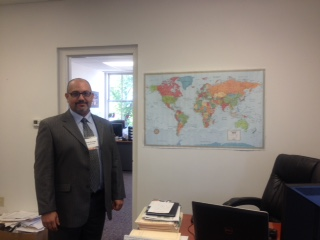 One of the primary promises we make to our customers is to deliver their products to the right place, on time and intact. This has enabled Logistics Plus to earn a reputation for great service while growing on a global scale. After establishing offices in the United States, Europe, Asia and Africa, Logistics Plus has added another important region to its global network: the Middle East.
One of the primary promises we make to our customers is to deliver their products to the right place, on time and intact. This has enabled Logistics Plus to earn a reputation for great service while growing on a global scale. After establishing offices in the United States, Europe, Asia and Africa, Logistics Plus has added another important region to its global network: the Middle East.
In 2013, when Imad Murtada first joined Logistics Plus as a business development manager, it only had one logistics agent in the region. It wasn’t long, however, until Imad, who brought with him many years of logistics experience in the region, utilized his connections and expertise to connect the Middle East to the world through Logistics Plus. Today, Logistics Plus operates out of eight offices located in Bahrain, Egypt, Saudi Arabia, Libya and the United Arab Emirates.
“We went from nothing to generating over $1.5 million in revenue from our business in Bahrain and Egypt alone,” says Imad. “This is only the beginning. Some of the largest companies in the region do business with us now. Wescosa and Cristal in Saudi Arabia, and Food National and Transilwrap in Egypt, are just a few examples.”
Operating in the Middle East is not easy: the logistics industry there is competitive and requires extra-ordinary customer service skills. Not to mention the constant demand for high quality services and low rates. “You have to reply to customer e-mails within no more than fifteen minutes,” Imad explains “If you don’t, some other company will take your customer.”
Each country in the Middle East also has its own set of rules, which is why it is very essential that logistics employees are aware of these rules and abide by them. To address cultural differences, Logistics Plus hires professionals that are familiar with these cultures and can speak the local languages fluently.
The number one key to succeeding in the region, according to Imad, is to build solid customer relationships with customers. “Customers in the Middle East value the relationship you have with them,” he says. “If they like you, they will be loyal customers.”
When asked about the political situation, Imad says that although the situation in the Middle East is volatile in some areas, that has not affected existing business. That’s because most shipments are made through either ocean or air freight, and “blacklisted” areas do not even have to be involved in the process. Despite the volatile political situation in some of the regions, business is still flourishing in other parts of the Middle East. In fact, according to the Brookings Institution, this year the city of Dubai was ranked the fifth highest performing metropolitan economy in the world. Last month, Logistics Plus opened its first office there.
Imad is very optimistic about the future of Logistics Plus in the Middle East, and he sees the potential for even more expansion in the region. “We are still relatively new in the area,” Imad says. “We are still building our brand and reputation, and we are doing a great job. As a result, more and more businesses are calling us for logistics solutions in the region.”
For more information about different logistics services in the Middle East, please contact:
Imad Murtada (Business Development Specialist): imad.murtada@logisticsplus.com
